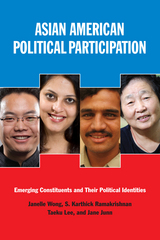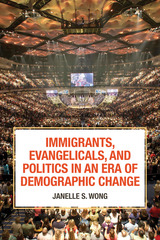2 books by Wong, Janelle S.

Asian American Political Participation
Emerging Constituents and Their Political Identities
Janelle S. Wong
Russell Sage Foundation, 2012
Asian Americans are a small percentage of the U.S. population, but their numbers are steadily rising—from less than a million in 1960 to more than 15 million today. They are also a remarkably diverse population—representing several ethnicities, religions, and languages—and they enjoy higher levels of education and income than any other U.S. racial group. Historically, socioeconomic status has been a reliable predictor of political behavior. So why has this fast-growing American population, which is doing so well economically, been so little engaged in the U.S. political system? Asian American Political Participation is the most comprehensive study to date of Asian American political behavior, including such key measures as voting, political donations, community organizing, and political protests. The book examines why some groups participate while others do not, why certain civic activities are deemed preferable to others, and why Asian socioeconomic advantage has so far not led to increased political clout. Asian American Political Participation is based on data from the authors’ groundbreaking 2008 National Asian American Survey of more than 5,000 Chinese, Indian, Vietnamese, Korean, Filipino, and Japanese Americans. The book shows that the motivations for and impediments to political participation are as diverse as the Asian American population. For example, native-born Asians have higher rates of political participation than their immigrant counterparts, particularly recent adult arrivals who were socialized outside of the United States. Protest activity is the exception, which tends to be higher among immigrants who maintain connections abroad and who engaged in such activity in their country of origin. Surprisingly, factors such as living in a new immigrant destination or in a city with an Asian American elected official do not seem to motivate political behavior—neither does ethnic group solidarity. Instead, hate crimes and racial victimization are the factors that most motivate Asian Americans to participate politically. Involvement in non-political activities such as civic and religious groups also bolsters political participation. Even among Asian groups, socioeconomic advantage does not necessarily translate into high levels of political participation. Chinese Americans, for example, have significantly higher levels of educational attainment than Japanese Americans, but Japanese Americans are far more likely to vote and make political contributions. And Vietnamese Americans, with the lowest levels of education and income, vote and engage in protest politics more than any other group. Lawmakers tend to favor the interests of groups who actively engage the political system, and groups who do not participate at high levels are likely to suffer political consequences in the future. Asian American Political Participation demonstrates that understanding Asian political behavior today can have significant repercussions for Asian American political influence tomorrow.
[more]

Immigrants, Evangelicals, and Politics in an Era of Demographic Change
Janelle S. Wong
Russell Sage Foundation, 2018
As immigration from Asia and Latin America reshapes the demographic composition of the U.S., some analysts have anticipated the decline of conservative white evangelicals’ influence in politics. Yet, Donald Trump captured a larger share of the white evangelical vote in the 2016 election than any candidate in the previous four presidential elections. Why has the political clout of white evangelicals persisted at a time of increased racial and ethnic diversity? In Immigrants, Evangelicals, and Politics in an Era of Demographic Change, political scientist Janelle Wong examines a new generation of Asian American and Latino evangelicals and offers an account of why demographic change has not contributed to a political realignment.
Asian Americans and Latinos currently constitute 13 percent of evangelicals, and their churches are among the largest, fastest growing organizations in their communities. While evangelical identity is associated with conservative politics, Wong draws from national surveys and interviews to show that non-white evangelicals express political attitudes that are significantly less conservative than those of their white counterparts. Black, Asian American, and Latino evangelicals are much more likely to support policies such as expanded immigration rights, increased taxation of the wealthy, and government interventions to slow climate change. As Wong argues, non-white evangelicals’ experiences as members of racial or ethnic minority groups often lead them to adopt more progressive political views compared to their white counterparts.
However, despite their growth in numbers, non-white evangelicals—particularly Asian Americans and Latinos—are concentrated outside of swing states, have lower levels of political participation than white evangelicals, and are less likely to be targeted by political campaigns. As a result, white evangelicals dominate the evangelical policy agenda and are overrepresented at the polls. Also, many white evangelicals have adopted even more conservative political views in response to rapid demographic change, perceiving, for example, that discrimination against Christians now rivals discrimination against racial and ethnic minorities.
Wong demonstrates that immigrant evangelicals are neither “natural” Republicans nor “natural” Democrats. By examining the changing demographics of the evangelical movement, Immigrants, Evangelicals, and Politics in an Era of Demographic Change sheds light on an understudied constituency that has yet to find its political home.
Asian Americans and Latinos currently constitute 13 percent of evangelicals, and their churches are among the largest, fastest growing organizations in their communities. While evangelical identity is associated with conservative politics, Wong draws from national surveys and interviews to show that non-white evangelicals express political attitudes that are significantly less conservative than those of their white counterparts. Black, Asian American, and Latino evangelicals are much more likely to support policies such as expanded immigration rights, increased taxation of the wealthy, and government interventions to slow climate change. As Wong argues, non-white evangelicals’ experiences as members of racial or ethnic minority groups often lead them to adopt more progressive political views compared to their white counterparts.
However, despite their growth in numbers, non-white evangelicals—particularly Asian Americans and Latinos—are concentrated outside of swing states, have lower levels of political participation than white evangelicals, and are less likely to be targeted by political campaigns. As a result, white evangelicals dominate the evangelical policy agenda and are overrepresented at the polls. Also, many white evangelicals have adopted even more conservative political views in response to rapid demographic change, perceiving, for example, that discrimination against Christians now rivals discrimination against racial and ethnic minorities.
Wong demonstrates that immigrant evangelicals are neither “natural” Republicans nor “natural” Democrats. By examining the changing demographics of the evangelical movement, Immigrants, Evangelicals, and Politics in an Era of Demographic Change sheds light on an understudied constituency that has yet to find its political home.
[more]
READERS
Browse our collection.
PUBLISHERS
See BiblioVault's publisher services.
STUDENT SERVICES
Files for college accessibility offices.
UChicago Accessibility Resources
home | accessibility | search | about | contact us
BiblioVault ® 2001 - 2024
The University of Chicago Press









